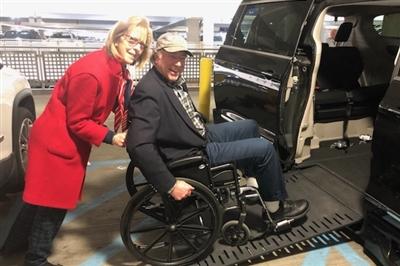Doctor becomes patient: Acute multiple cranial nerve neuritis
It was 7:38 AM on March 15, 2019, when Stuart Gordon found himself losing his balance and stumbling around. He became “ataxic”—losing control of muscle and movement and the ability to pick things up. The 64-year-old had some sense of what was happening—after all he was a practicing doctor himself, having spent 35 years specializing in hip and knee reconstruction surgery at Rothman—yet could never have imagined that because of a virus he’d soon be bound to a wheelchair for the next two months and learning to walk and talk again.
When his episodes began, Dr. Gordon went by ambulance to Lankenau Medical Center for a full diagnostic workup, including MRI, MRA, lumbar puncture and lab tests, but everything came back negative. After a week and a half of diagnostic studies and hospitalization, he was diagnosed with post-inflammatory cranial nerve neuritis of cranial nerves five, eight and ten. The virus had also affected his vestibular nerve and vagus nerve, as well as the periphery of his brain stem on the right side of the body.
Outpatient neuro rehab begins with goals in mind—like dancing at son’s wedding
After being treated in the acute care hospital, Dr. Gordon arrived for an inpatient stay at Bryn Mawr Rehab Hospital for three weeks where he began physical, occupational and speech therapy.
Although he didn’t have the blessing of his doctor because it was so soon into his recovery, Dr. Gordon was determined to keep his commitment to being a keynote speaker at a conference in Indianapolis, Indiana, about four weeks after he first became ill. The therapists at Bryn Mawr Rehab advised him on what to do to safely transfer himself from wheelchair to airplane seat and to safely move about while traveling.
He successfully delivered his keynote address and continued his recovery at home with a skilled home therapist. After three weeks of hard work (and the help of this 118-pound but fiercely strong wife), Dr. Gordon began outpatient physical therapy at Bryn Mawr Rehab where vestibular therapy was recommended for his condition. Vestibular therapy helps patients develop balance techniques through sensorimotor training and visual exercises.
Sheri Klock, PT, DPT, a vestibular therapist at the outpatient location in Wynnewood, knew Dr. Gordon would be a challenging case, given his diagnostic scans were negative yet his gait was ataxic. He required use of a wheelchair, he needed assistance to walk, and he had complaints of dizziness and light sensitivity which were causing difficulty reading.
“His balance tests confirmed he was at a higher fall risk,” explains Klock. “He was experiencing dizziness because his eyes had a hard time coordinating with his head movements. And due to sensitivity to light, he needed to be treated in a darkened room or wearing a hat.”

- Vestibular therapy to coordinate his eyes and head movements
- Balance, coordination and weight-shifting exercises
- Gait and postural training with a rolling walker
- Strengthening exercises for his core muscles
- A home exercise program
Adds Klock, “Dr. Gordon was very motivated to do what he needed to do and was very compliant with his home program.”
One aspect of Dr. Gordon’s inpatient therapy was use of the Vector body weight gait training system. The Vector involves getting into a harness that is mounted on a ceiling track and eliminates gravity for the patient so the person can have the experience of walking and other types of everyday movement while also bearing some weight and building strength in their legs. Gait training also helps patients get moving more quickly and with greater confidence.
“In 35 years (in my profession) I’ve dealt with all kinds of therapists but I’ve never been involved in neurologic rehabilitation,” says Dr. Gordon. “For the first time I really understand what it means to be neurologically impaired, to have to improve my walking and speech through the help of therapists, to transfer from the wheelchair to the bed or chair with two people then one person then by myself. With their help, I gained confidence. But what I most remember about Bryn Mawr Rehab was the enthusiastic support and skill of the therapists. I had such a great team around me – an envelope of love and excellence that surrounded me at every moment I was there.”
“What I most remember about Bryn Mawr Rehab was the enthusiastic support and skill of the therapists. I had such a great team around me—an envelope of love and excellence that surrounded me at every moment I was there.”
A high standard of safety was something else Dr. Gordon noticed at Bryn Mawr Rehab. Everyone from the dietary worker to the nursing aid to the occupational therapist carefully supervised his movements to ensure safety all times.
“When you’re in a wheelchair there are two elements that change completely: surface and space,” he explains. “Space, you’re limited by the reach of your arms, with no legs to get you to the space beyond your arms, and surface, the ridges and uneven areas you have to navigate. Here I am an active, vibrant orthopedic surgeon and now I’m vulnerable, nonambulatory. As a physician, I felt an enormous amount of respect for the professionalism and skill and caring reassurance of the people who were helping me—how to use bathroom safely, how to move from one space to the other, how to walk with the walker. It was an incredibly positive experience.”
“Here I am an active, vibrant orthopedic surgeon and now I’m vulnerable, non-ambulatory. As a physician, I felt an enormous amount of respect for the professionalism and skill and caring reassurance of the people who were helping me—how to use bathroom safely, how to move from one space to the other, how to walk with the walker. It was an incredibly positive experience.”
From neurologically compromised to newfound appreciation for rehab therapists
At each session, Dr. Gordon reported significantly noticeable improvements. He experienced less dizziness, he returned to driving, and his balance improved. He was soon able to advance to a cane and eventually to no assistive device. He continued his therapy, practicing his golf swing as well as his dance steps, and even won a luau dance contest at the Union League National Golf Club over Labor Day weekend.
It’s now been five months since Dr. Gordon began his recovery from multiple cranial nerve neuritis. He reports being at 80% of normal and continues going to Bryn Mawr Rehab’s outpatient vestibular therapy in Wynnewood with Sheri Klock (who’s “just as excellent” as the inpatient therapist, he says), and has helped see his scores improve by almost 100%.
Of her part in Dr. Gordon’s recovery process, Klock says it’s what she loves about the work she’s been doing for the past 20 years. “I have been able to wake up, go to work and help people regain their quality of life. Not only do I help people function and feel better, I meet amazing people along the way. Everyone has their own story to tell and I love getting to know different people. I become a part of my patient’s journey in life and because I learn so much from them as well, they become a part of mine.”
“People don’t understand. I’m a so-called ‘expert’ in musculoskeletal disease and rehab yet I had no idea what these therapists do. What I do is Little League compared to what they do at Bryn Mawr Rehab. These are major league therapists—big-hitters.”
And while Dr. Gordon has resumed practice as a hip and knee reconstruction surgeon, his view of a patient’s recovery and the rehabilitation specialists who make it possible, will never be the same.
“People don’t understand. I’m a so-called ‘expert’ in musculoskeletal disease and rehab yet I had no idea what these therapists do. What I do is Little League compared to what they do at Bryn Mawr Rehab. These are major league therapists—big-hitters.” Although he’s now given up his favorite wheelchair phrase: “Where’s the cutout?!” Dr. Gordon continues to have a deep-seated appreciation for accessible signage, products and equipment. “I knew about them, but I didn’t feel them.”

And yes, he even danced on his feet at his son’s wedding.
Main Line Health serves patients at hospitals and health centers throughout the western suburbs of Philadelphia. To schedule an appointment with a specialist at Main Line Health, call 1.866.CALL.MLH (225.5654).
 Content you want, delivered to your inbox
Content you want, delivered to your inbox
Want to get the latest health and wellness articles delivered right to your inbox?
Subscribe to the Well Ahead Newsletter.
